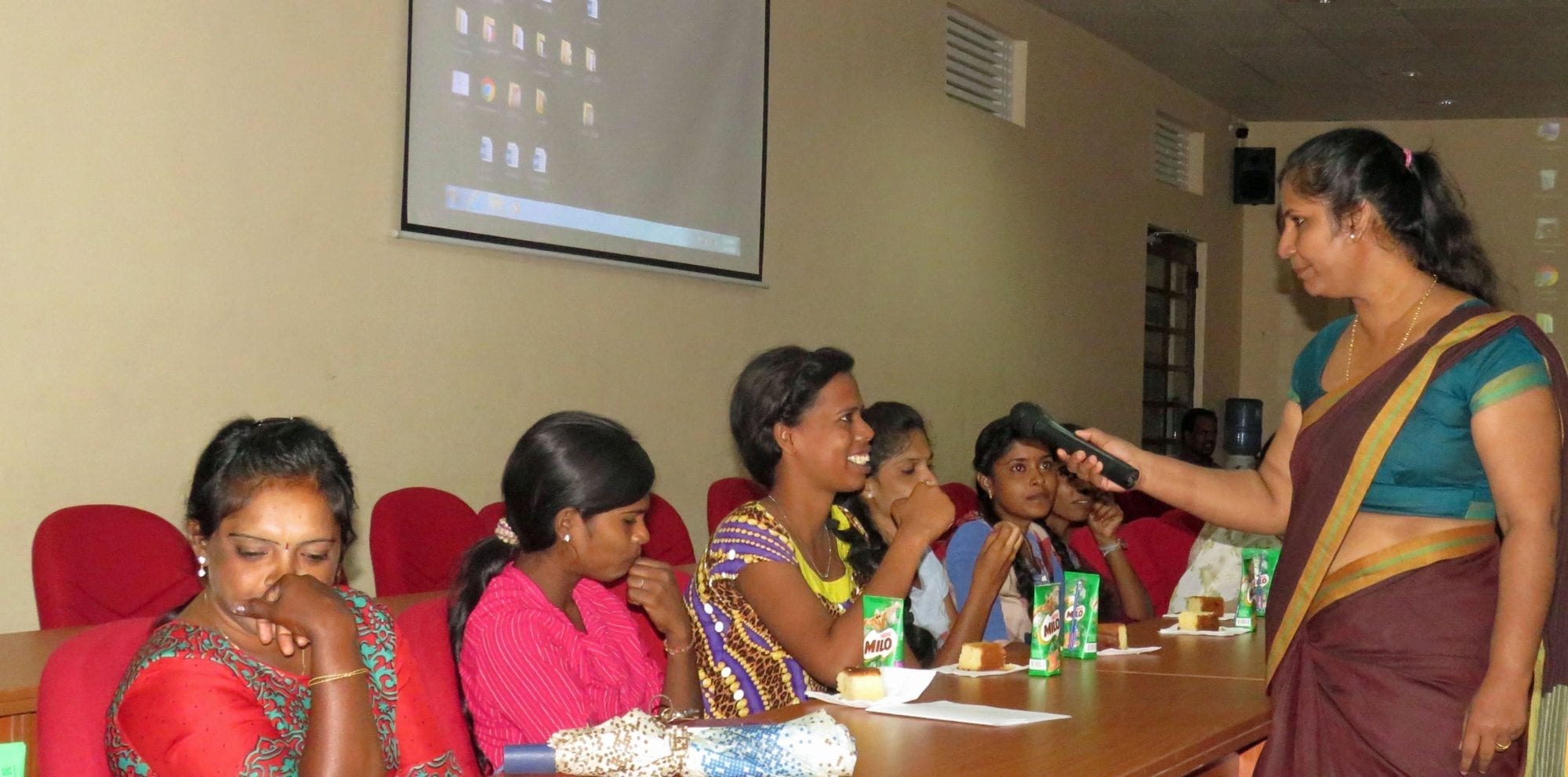
Apr 5, 2018
Nearly 50 cleaning-sector employees from offices throughout Jaffna, Sri Lanka, discussed strategies for addressing gender-based violence at work and how unions can be instrumental in empowering workers to tackle the problem during a recent Solidarity Center training.
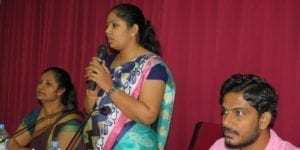
For most participants, the gender equality at work session was their first exposure to the issue. Credit: Solidarity Center/Suthakar
The 28 women and 18 men who provide cleaning services for courts, banks and finance companies began the daylong workshop with a discussion on how workers can be discriminated against based on gender, one aspect of which is gender-based violence at work.
Gender-based violence at work takes multiple forms, including physical and verbal abuse and sexual assault targeted at an individual based on gender. The Solidarity Center is taking part in a global campaign for passage of an International Labor Organization (ILO) convention covering gender-based violence at work.
For most participants, the gender equality workshop was their first experience discussing the issue, and some shared that were not aware of constitutes gender- based violence at work.
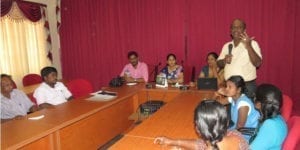
Credit: Solidarity Center/Suthakar
Participants also noted that some of their transgender co-workers frequently are bullied by employers, co-workers and office staff.
Participants also heard from labor lawyers on their fundamental workplace rights, with some saying they did not know they had the right to be paid overtime, double pay on holidays or even that they could form a union. Participants raised many questions about how best to overcome the obstacles they faced in forming unions.
Because “cleaning-sector employees are a very vulnerable working sector, this session aimed to improve their awareness level of basic labor rights and practices,” says Rubini Nishanth, Solidarity Center legal counsel in Jaffna, who moderated the workshop.
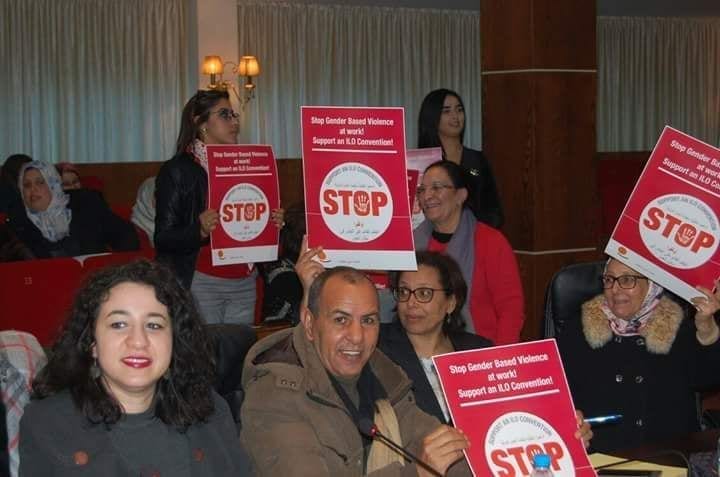
Mar 8, 2018
Women union activists and their allies in Morocco and Tunisia celebrated International Women’s Day this week with events that highlighted the need for a global standard to address gender-based (GBV) violence at work.
“Violence is escalating dramatically. Without an international agreement and deterrent laws that protect women at home, in society and in workplaces, we cannot move forward,” says Saida Ouaid, a member of the Executive Office of the Democratic Confederation of Labor (CDT) in Morocco.
Ouaid and other women union leaders and allies took part in a March 6 event “Toward an International Convention for the Elimination of Gender-Based Violence in the Workplace” at the Parliament in Rabat, in coordination with Morocco’s Secretariat of Equity and Equality.
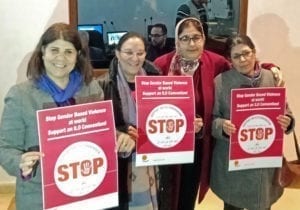
Touriya Lahrech (far left),coordinator of the CDT’s Women Department, joins women union members to discuss an ILO convention addressing gender-based violence at work. Credit: Mohamed Yakkane
The International Labor Organization (ILO) is considering a convention (regulation) that would address violence and harassment against workers. The Solidarity Center is part of an International Trade Union Confederation (ITUC) campaign for passage of a strong ILO convention.
In Tunisia, 100 union members from across the country gathered for a March 8 event where they also discussed the need for passage of an ILO convention on gender-based violence at work.
“The gathering is an opportunity for women to stand up for their struggles to defend their rights and freedom, and to promote equality and an environment free of violence,” Samir Al-Shefi, deputy general-secretary of the General Union of Tunisian Workers (UGTT) Women, Youth and Association, said in opening the event.
Naima Hammami, one of two women on the UGTT’s executive office, paid tribute to the struggles of Tunisian, Palestinian, Syrian and Arab women around the world. The event was sponsored by UGTT’s Women, Youth and Association Department, together with the Solidarity Center.
Gender-Based Violence ‘Widespread at Work’
At both the Morocco and Tunisia events, experts discussed preliminary findings on gender-based violence at work based on participatory field research sponsored by the Solidarity Center and CDT in Morocco and the UGTT in Tunisia.
Discussing the research in Morocco, Najat Al-Razi, a gender specialist and sociologist, says gender-based violence is “widespread in the world of work,” and “the most common form of violence against women in workplaces is sexual harassment.”
Asma al-Marani, a member of the Moroccan Union of Labor and the Arab Trade Union Confederation, pointed out that her union receives daily complaints about violence at work from women working in the precarious and informal economy.
CDT leaders noted that as part of the global campaign for an international convention on the elimination of violence in the world of work, the union will continue meeting with a range of allies at the grassroots level until the Geneva Conference with a campaign to push the government to support the ILO draft convention, supplemented by a guiding document implementing the convention.
Representatives from the Njda Center, the Jusour Association, the Women’s Labor Union, the Association of Women for Equality and Democracy (Afed) and other union leaders and journalists also took part in the Rabat event.
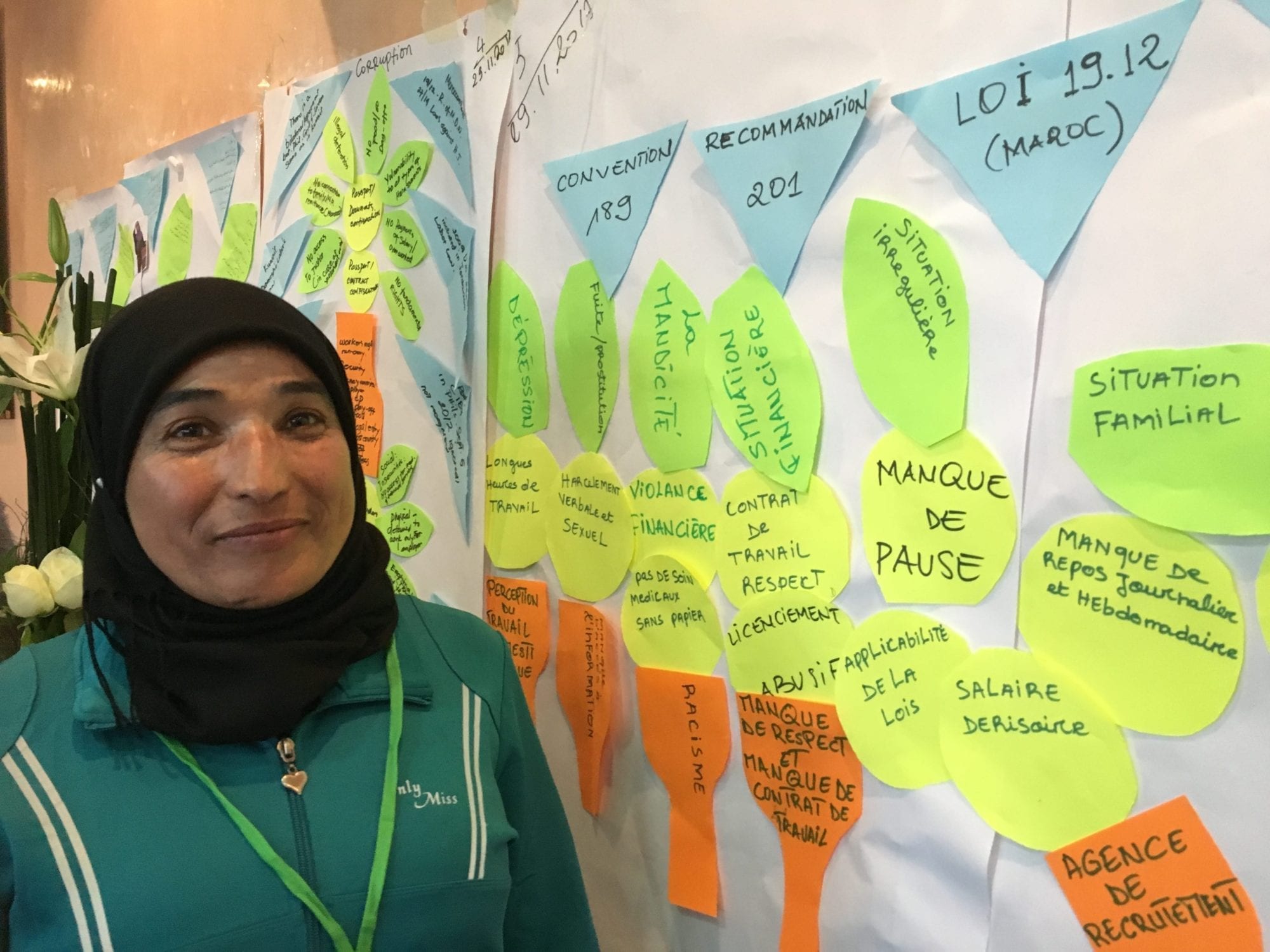
Mar 7, 2018
Sorting olives, picking peaches and cultivating fields across a vast agro-industrial complex outside Meknes, Morocco, Hayat Khomssi says women workers like her once did not have access to higher-skilled jobs and leadership positions. But after she and her co-workers took part in Solidarity Center gender equality trainings and other skills-building workshops, more than 1,000 farm workers at the Les Domaines Brahim Zniber farm in 2015 negotiated their first collective bargaining agreement.
“Now we have achieved a similar status to that of the men,” she says, speaking through a translator. “Now women are able to be supervisors, team leaders, and are able to do pruning as well. Now they are equal to men in term of tasks but also in terms of pay.”
This year, International Women’s Day draws attention to the rights and activism of rural women like Khomssi and her co-workers, echoing the priority theme of next week’s 62nd session of the United Nations Commission on the Status of Women (CSW) in New York City.
Celebrated annually on March 8, International Women’s Day this year builds on the current #MeToo movement for women’s rights, equality and justice, with women union activists and their allies holding marches, taking part in social media campaigns and hosting events around the globe to call for gender equality in wages, working conditions, political representation and more.
Follow UN Women’s Day events on Twitter with the hashtag #TimeIsNow.
Women’s Empowerment through Collective Bargaining
Morocco farm women will be among several rural women union activists discussing their advancements through gender equality training and collective bargaining on a Solidarity Center panel at the CSW, “Rural Agricultural Women Workers Organizing to Increase Equality and Empowerment.” They will be joined by Ayat Al Bakr, a Jordanian agricultural worker.
Some 564 million women work in agriculture, and those in commercial agriculture are predominantly concentrated in temporary, informal and seasonal jobs, where they receive low wages and few or no benefits, and are exposed to dangerous and unsafe working conditions.
A key part of Solidarity Center gender equality training involves exploring strategies for addressing gender-based violence at work. Gender-based violence (GBV) is one of the most prevalent human rights violations in the world—yet not enough is done to prevent it, especially at the workplace.
Globally, after years of campaigning by workers and their unions, the International Labor Organization (ILO) is negotiating a standard addressing gender-based violence at work. Workers around the world could have access to a binding international standard covering gender-based violence at work after it is finalized. The Solidarity Center is working with the International Trade Union Confederation (ITUC), which is coordinating the global union campaign for its passage. Find out how you can get involved.
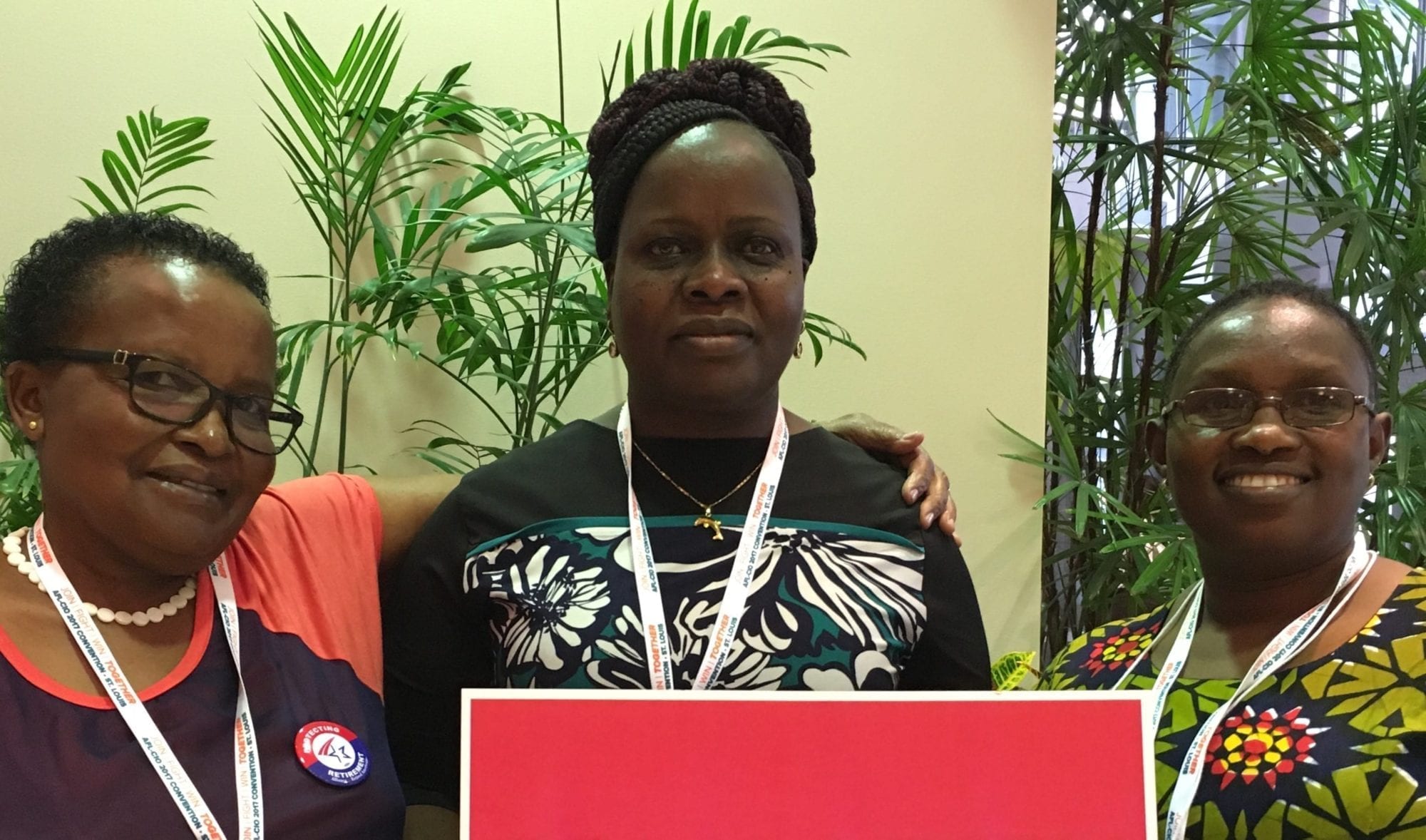
Dec 20, 2017
As part of our year in review series, we are highlighting the 12 most popular Solidarity Center web stories of 2017. This story received the most reach on our Facebook page in October. Read the full story here.
When Rose Omamo started work in 1988 as a mechanic in a vehicle assembly plant in Kenya, she was one of two women in a workplace dominated by hundreds of men. Her employer refused to recognize the women’s basic requests, and even her union, the Amalgamated Union of Kenya Metal Workers, negotiated contracts that excluded their concerns.
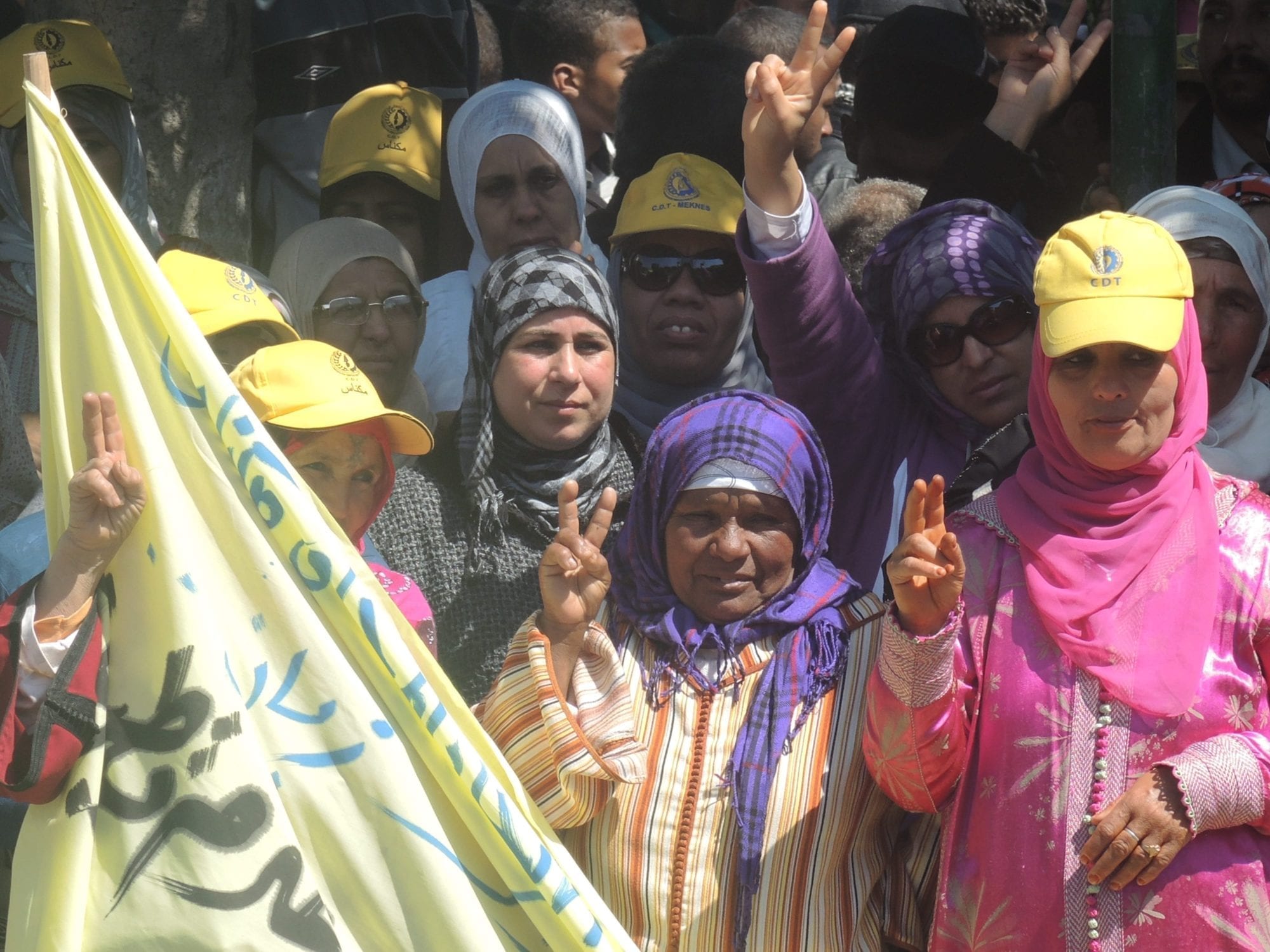
Dec 19, 2017
As part of our year in review series, we are highlighting the 12 most popular Solidarity Center web stories of 2017. This story received the most reach on our Facebook page in November. Read the full story here.
Agricultural work remains one of the most dangerous in the world. And women, who comprise between 50 percent and 70 percent of the informal workforce in commercial agriculture, are especially vulnerable to sexual harassment, physical abuse and other forms of gender-based violence at work.








